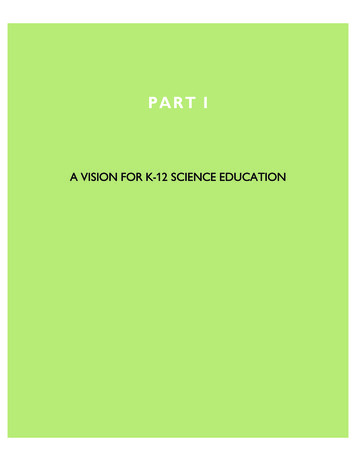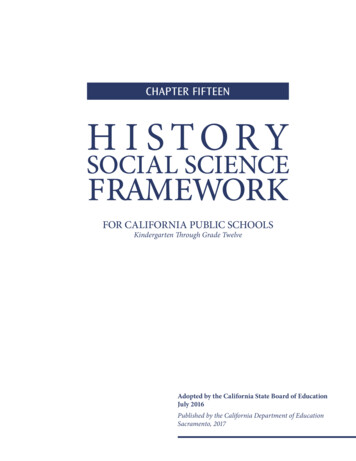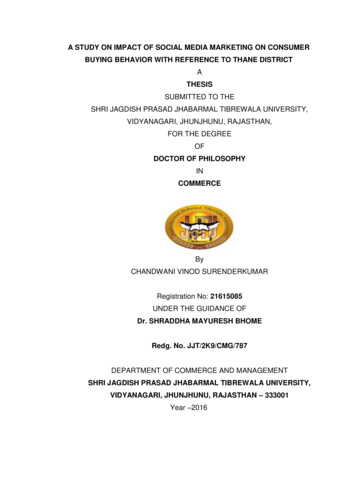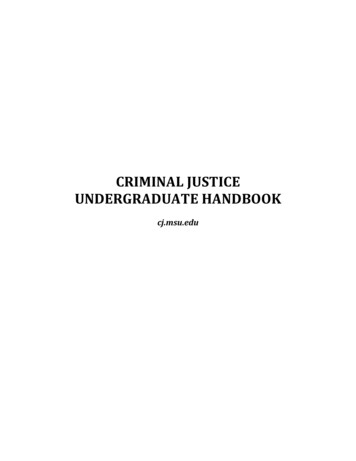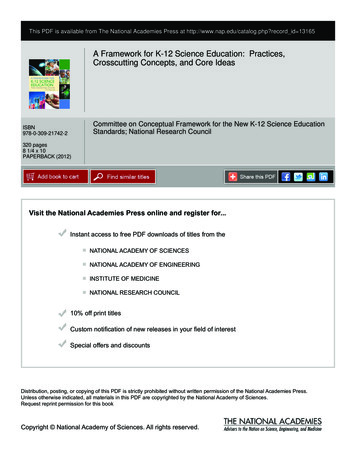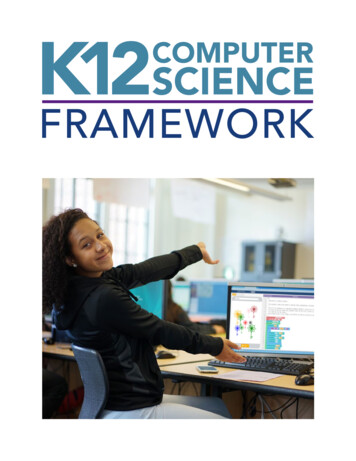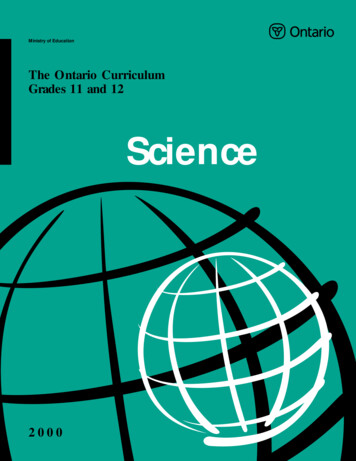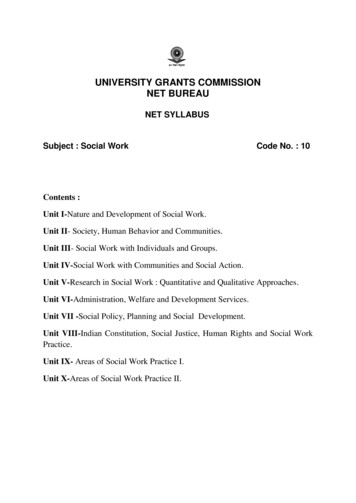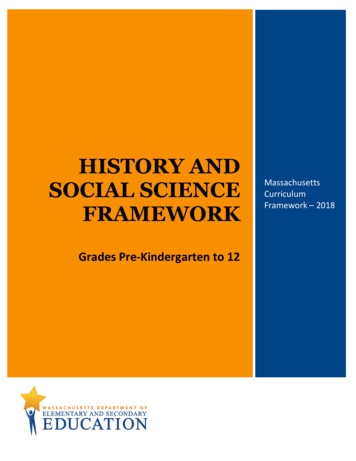
Transcription
HISTORY ANDSOCIAL SCIENCEFRAMEWORKGrades Pre-Kindergarten to 12MassachusettsCurriculumFramework – 2018
This document was prepared by the Massachusetts Department of Elementary and Secondary EducationBoard of Elementary and Secondary Education MembersMr. Michael Moriarty, HolyokeMr. Paul Sagan, Chair, CambridgeMr. James Peyser, Secretary of Education, MiltonMr. James Morton, Vice Chair, BostonMs. Mary Ann Stewart, LexingtonMs. Katherine Craven, BrooklineDr. Martin West, NewtonDr. Edward Doherty, Hyde ParkMs. Hannah Trimarchi, Chair, Student AdvisoryMs. Amanda Fernandez, BelmontCouncil, MarbleheadMs. Margaret McKenna, BostonJeffrey C. Riley, Commissioner and Secretary to the BoardThe Massachusetts Department of Elementary and Secondary Education, an affirmative action employer, iscommitted to ensuring that all of its programs and facilities are accessible to all members of the public. We donot discriminate on the basis of age, color, disability, national origin, race, religion, sex, or sexual orientation.Inquiries regarding the Department’s compliance with Title IX and other civil rights laws may be directed to theHuman Resources Director, 75 Pleasant St., Malden, MA, 02148, 781-338-6105. 2018 Massachusetts Department of Elementary and Secondary Education.Permission is hereby granted to copy any or all parts of this document for non-commercial educationalpurposes. Please credit the “Massachusetts Department of Elementary and Secondary Education.”Massachusetts Department of Elementary and Secondary Education75 Pleasant Street, Malden, MA 02148-4906Phone 781-338-3000 TTY: N.E.T. Relay 800-439-2370www.doe.mass.edu
Massachusetts Department ofElementary and Secondary Education75 Pleasant Street, Malden, Massachusetts 02148-4906Telephone: (781) 338-3000TTY: N.E.T. Relay 1-800-439-2370Jeffrey C. RileyCommissionerDear Colleagues:I am pleased to present to you the 2018 Massachusetts History and Social Science CurriculumFramework, which was adopted by the Board of Elementary and Secondary Education on June 26, 2018.This Framework is built upon the foundation of the 2003 and 1997 Massachusetts History and SocialScience Curriculum Frameworks. Based in research on effective practice, it represents the contributionsof members of the History and Social Science Curriculum Framework Review Panel, scholars who servedas Content Advisors, and the more than 700 individuals and organizations who provided commentsduring the public comment period in early 2018. This revision of the Framework retains the strengths ofthe previous frameworks and includes these improved features: increased emphasis on civics at all grade levels, including a new grade 8 course on civics; inclusion of standards that reflect the diversity of the United States and world cultures, withparticular attention to the contributions of women and men of all ethnicities andbackgrounds in the United States and the connections among world cultures; new Standards for History and Social Science Practice and questions to guide inquiry; stronger attention to the intersection of history, social science, and literacy instruction,through the inclusion of literacy standards for history and social science; expanded examples of primary sources representing significant texts, maps, photographs,and works of art and architecture in United States and world history; new standards for financial literacy and news/media literacy.A companion document, Resources for History and Social Science, contains annotated lists ofrecommended websites, Massachusetts and New England museums, archives, and historic sites, andimportant civic holidays and commemorations. A section of the Resource Guide also documents actionstaken to promote civic education by the Massachusetts Board of Elementary and Secondary Education,the Massachusetts Board of Higher Education, and the Legislature, 2011–2018.We hope that the Framework will be a resource of lasting value for schools and districts. Thank youagain for your ongoing support and for your commitment to a rich and broad curriculum for all students.Sincerely,Jeffrey C. RileyCommissioner of Elementary and Secondary Education
Table of ContentsAcknowledgements. 6Vision and Introduction: Building on a Strong Foundation . . .9A Renewed Mission: Education for Civic Life in a Democracy . 12Guiding Principles . 13The Scope, Sequence, and Content of the Grades and Courses. 17The Organization of the Standards and Appendices . 20A Guide to Reading the Introductory Page for Each Grade or Course .21StandardsStandards for History and Social Science Practice, Pre-K–12 . 22Introduction to the Elementary Grades:Flexible Options for Teaching History and Social Science . . .26Pre-Kindergarten Content and Literacy Standards . 27Kindergarten Content and Literacy Standards. 32Grade 1 Content and Literacy Standards . 38Grade 2 Content and Literacy Standards . 45Grade 3 Content and Literacy Standards . 52Grade 4 Content and Literacy Standards . 61Grade 5 Content and Literacy Standards . 71Introduction to the Middle Grades:Flexible Options for Teaching History and Social Science .83Grade 6 Content Standards. .85Grade 7 Content Standards. 95Grade 8 Content Standards. 104Grades 6–8 Literacy Standards for History and Social Science . 113Introduction to the High School Grades:Flexible Options for Teaching History and Social Science .117United States History I . 120United States History II . .129World History I . .139World History II . 148ElectivesUnited States Government and Politics Elective . 162Economics Elective . 169Standards for Personal Financial Literacy . .173Standards for News/Media Literacy . .176Grades 9–10 and 11–12 Literacy Standards for History and Social Science . 180Massachusetts Curriculum Framework for History and Social Science4
AppendicesA. Application of the Standards for English Learners and Students withDisabilities . .189B. History and Social Science Inquiry: Designing Questions andInvestigations . 194C. Selecting and Using Primary Sources . 198D. Key and Suggested Annotated Primary and Secondary Sources for United States History andCivicsNote: There is a companion document to this Framework. Resources for History and Social Science: Supplement to the 2018 MassachusettsHistory and Social Science Curriculum FrameworkMassachusetts Curriculum Framework for History and Social Science5
AcknowledgementsMassachusetts Curriculum Framework for History and Social Science Review Panel 2017–2018Jason Hilton, Social Studies Teacher, Wachusett*Antonio Arvelo, Humanities Teacher, MargaritaRegional High SchoolMuñiz Academy, Boston Public Schools*Christopher Hoeh, Second Grade Teacher,Kathleen Babini, Social Studies CurriculumCambridge Friends SchoolCoordinator, Plymouth Public Schools (Retired)*Laura Hubert, Teacher and Coach, BerkowitzLaura Baker, Professor of History and HistoryElementary School, Chelsea Public SchoolsEducation, Fitchburg State University*Adam Ingano, History and Social StudiesDebra Block, Consultant, English Language ArtsCoordinator, grades 6–12, Westford Publicand History/Social StudiesSchoolsAdrianne Billingham Bock, Social StudiesFrances Jones-Sneed, Professor of History,Program Coordinator, grades K–12, AndoverMassachusetts College of Liberal ArtsPublic SchoolsColleen Kelly, History and Social Science Liaison,*Kelley Brown, Social Studies Department HeadWorcester Public Schoolsand Professional Development Coordinator,*Angela Lee, History Teacher, Weston HighEasthampton High SchoolSchoolRichard Cairn, Emerging America ProgramGorman Lee, Director of Social Studies, BraintreeDirector, Collaborative for Educational ServicesPublic SchoolsKathleen Conole (Retired) Director of CurriculumSusan Majka, Director of Social Studies,and Instruction, Greater Lowell Technical HighSpringfield Public SchoolsSchoolRashaun Martin, Social Studies and World*Casey Cullen, History Teacher, WestboroughLanguages Supervisor, Haverhill Public SchoolsHigh SchoolChristopher Martell, Professor and Social StudiesJack Cutone, Professor of Economics,Education Program Director, Boston UniversityQuinsigamond Community College*Anthony Mathieu, Social Studies Teacher,Roger Desrosiers, Massachusetts StateBoston Latin Academy, Boston Public SchoolsCoordinator, We the People Program of theEileen McQuaid, Associate Principal ofCenter for Civic EducationCurriculum and Instruction, Brockton PublicVernon Domingo, Professor of Geography,SchoolsBridgewater State UniversityMichelle Morrissey, Director of Instruction inLouise Dube, Executive Director, iCivicsHumanities and World Languages, Boston*Kerry Dunne, Middle and High School HistoryCollegiate Charter SchoolTeacher and Department Head, Weston Public*Justin Norton, Eighth Grade HumanitiesSchoolsTeacher, Boston Latin Academy, Boston Public*Laura Edouard, Vice Principal and HistorySchoolsTeacher, City on a Hill Charter School*Matthew Oosting, History Teacher, NorthPatricia Fontaine, Professor of HistoryReading Public SchoolsEducation, UMass Lowell*Robert Powers, History and Social Science*Linda Forte, Teacher, Midland StreetDirector, Plymouth Public SchoolsElementary School, Worcester Public Schools*Debra Price, Teacher, Harvard-Kent ElementaryL'Merchie Frazier, Director of Education andSchool, Boston Public SchoolsInterpretation, Museum of African AmericanJosé Reyes, Supervisor of Humanities 6–12,History, Boston and NantucketMarlborough Public SchoolsAnastasia Gogol, Associate Director, DiscoveringSiobhan Ryan, Director of School ImprovementJusticeand Leadership Services, Fall River Public Schools*William Golen, Social Studies CurriculumCoordinator, Williams Middle School,Longmeadow Public SchoolsMassachusetts Curriculum Framework for History and Social Science6
Roberta Schaefer, Founder, Worcester RegionalResearch Bureau; Lecturer/Visiting AssistantProfessor, Political Science; former member ofthe Board of Elementary and SecondaryEducationNatacha Scott, Director of History and SocialStudies, Boston Public SchoolsCedric Woods, Director, University ofMassachusetts Boston Institute for New EnglandNative American Studies*PK-12 TeachersContent AdvisorsBrad Austin, Professor, Salem State University(United States history)Tim Bailey, Director of Education, the GilderLehrman Institute of American History (UnitedStates History)Craig Benjamin, Professor, Grand Valley StateUniversity, Michigan (world history)Rosemary Blanchard, Chair, Human RightsEducation Community of the National Council forthe Social Studies and Co-Vice-Chair, HumanRights Educators USA (human rights)Maureen Costello, Teaching Tolerance Director,Southern Poverty Law Center (African Americanhistory)Robert Forrant, Professor, University ofMassachusetts, Lowell (industrial history)Debra Fowler, Co-Executive Director, HistoryUnerased, Inc., former teacher, Lowell HighSchool (LGBTQ history)Janet Furey, teacher, Weston Public Schools,Retired, standards writer (elementarycurriculum, technology)Robert Furey, History and Social ScienceDepartment Head, Concord-Carlisle RegionalSchool, Retired (Civics, United States History)Nitana Greendeer, Education Director, MashpeeWampanoag (Massachusetts Native Peopleshistory)William R. Keylor, Professor, Boston University(modern United States and international history)Priya Lal, Associate Professor, Boston College(African and world history)Cris Martin, Outreach Director of the Davis Centerfor Russian and Eurasian Studies, HarvardUniversity (Russian and Eurasian history)Members of The Massachusetts State StudentAdvisory Council Civic Education andEngagement Workgroup 2017–2018Chris Bezdedeanu, Workgroup Chair, BrianAnastasio, Workgroup CommunicationsCoordinator, Hannah Trimarchi, CouncilChairwoman, Litzy Rodriguez, Council Vice Chair,Shreya Nair, Council CommunicationsCoordinator, Adam Cavanaugh, Jennie Chang,Dylan Gordon, Frederick Hanna, Jack Hurd,Megan Jens, Diana Kulmizev, Brandon Scott,Daphney SullyMiriam Morgenstern, Co-Executive Director,History Unerased, Inc., former teacher, LowellHigh School (LGBTQ and women’s history)Barbara Petzen, Director of Training Initiatives,Abshire-Inamori Leadership Academy Center forStrategic and International Studies (MiddleEastern history)Hilda Ramirez, Assistant Director, LatinoEducation Institute, Worcester State UniversityLaurel Thatcher Ulrich, 300th AnniversaryUniversity Professor, Harvard University (ColonialAmerican history, United States history to 1870,women, religion)Graham Warder, Associate Professor, KeeneState College, New Hampshire (United Stateshistory)Kirsten Weld, John L. Loeb Associate Professor ofthe Social Sciences, Department of History,Harvard University (South, Central American,Caribbean, and United States history)Cedric Woods, Director, University ofMassachusetts Boston Institute for New EnglandNative American Studies (Native Peoples of theAmericas)External PartnerJill Norton, Abt AssociatesMassachusetts Executive Office ofEducationB Kim, Policy AnalystTom Moreau, Assistant Secretary of EducationMassachusetts Department of HigherEducationRobert J. Awkward, Director of LearningOutcomes AssessmentMassachusetts Curriculum Framework for History and Social Science7
Patricia Marshall, Deputy Commissioner forAcademic Affairs and Student SuccessJohn Reiff, Director of Student Learning andEngagementArlene Rodriguez, Senior Advisor, Division ofAcademic Affairs and Student SuccessMassachusetts Department of EarlyEducation and CareJulie Casper, graduate research fellow, Societyfor Research in Child DevelopmentMassachusetts Department ofElementary and Secondary EducationJeffrey Wulfson, Deputy CommissionerHeather Peske, Senior Associate Commissioner,Center for Instructional SupportCenter for Instructional SupportRachel Bradshaw, Manager, Instructional PolicyDineen Caselli, Administrative OfficerAlexia Cribbs, Management Analyst IILisa Keenan, Management Analyst IIIKenneth Klau, Director of Instructional PolicyRonald Noble, Associate CommissionerOffice of Educator EffectivenessMatthew Holloway, Educator EffectivenessCoordinatorOffice of Language Acquisition and AchievementFernanda Kray, ELL Professional DevelopmentCurriculum CoordinatorOffice of Literacy and HumanitiesDavid Buchanan, Consultant, Co-Lead WriterMichelle Ryan, History and Social ScienceContent Support LeadSusan Wheltle, Consultant, Co-Lead WriterCenter for Educational OptionsCliff Chuang, Senior Associate CommissionerOffice of Adult and Community Learning ServicesOlivia C. Steele, Team LeaderOlympia Stroud, High School EquivalencyProgram CoordinatorOffice of Charter Schools and School RedesignAlison Bagg, DirectorOffice of College, Career and Technical EducationJennifer Appleyard, Early Warning SpecialistNyal Fuentes, Education SpecialistOffice of Student and Family SupportRachelle Engler Bennett, Associate CommissionerMary Jane Crotty, Educational SpecialistJane Haltiwanger, Early Learning SpecialistKristen McKinnon, SL SpecialistEmily Taylor, Early Learning SpecialistDonna Traynham, Education SpecialistCenter for District SupportOffice of Approved Special Education SchoolsMichelle Hennessy-Kowalchek, Public SchoolMonitoringOffice of Special Education Planning and PolicyAmanda Greene, Secondary TransitionCoordinatorElizabeth Kelliher, Assistant DirectorHolly-Anne Neal, IEP Revision CoordinatorTeri Valentine, DirectorLauren Viviani, Early Childhood SpecialEducation ManagerCenter for Student Assessment ServicesMichol Stapel, Associate CommissionerOffice of Test DevelopmentCatherine Bowler, MCAS Test DevelopmentDirectorAmy Carithers, Administrator for ELA TestDevelopmentJennifer Malonson, Middle School ELA TestDevelopmentGreg Tobey, Elementary School ELA TestDevelopmentThe authors and contributors to the 1997 and2003 editions of the Massachusetts Historyand Social Science Curriculum FrameworkMassachusetts Curriculum Framework for History and Social Science8
VisionAll Massachusetts students will be educated in the histories of the Commonwealth, the United States,and the world. They will be prepared to make informed civic choices and assume their responsibility forstrengthening equality, justice, and liberty in and beyond the United States.Introduction: Building on a Strong FoundationThe Framework in the Historical Context of Massachusetts EducationReformThe Massachusetts Education Reform Act of 1993 directed the state Board and Commissioner ofElementary and Secondary Education to develop academic standards in core subjects setting forth the“skills, competencies and knowledge” that students should possess at each grade or cluster of grades,with high expectations for student performance. 1 As to the core subject of history and social science, thelaw directs thatThe standards shall provide for instruction in at least the major principles of theDeclaration of Independence, the United States Constitution, and the FederalistPapers. They shall be designed to inculcate respect for the cultural, ethnic, andracial diversity of the Commonwealth and for the contributions made by diversecultural, ethnic and racial groups to the life of the Commonwealth. The standardsmay provide for instruction in the fundamentals of the history of theCommonwealth as well as the history of working people and the labor movementin the United States. The board may also include in the standards anawareness of global education and geography. 2The law further directs the Board and Commissioner to institute a process for drawing up curriculumframeworks for each of the core subjects, and to update, improve, and refine the standards andframeworks periodically.” 3Consistent with these responsibilities, the Board approved the initial Massachusetts History and SocialScience Curriculum Framework in 1997 and a revised framework in 2003. In 2017, the Department ofElementary and Secondary Education convened a panel of experienced Massachusetts educators toreview the 2003 History and Social Science Curriculum Framework and recommend revisions. With theBoard’s approval, the result of that open and consultative process is the 2018 Massachusetts Historyand Social Science Curriculum Framework.Massachusetts General Laws, Chapter 69, Section 1D.Ibid.3 Massachusetts General Laws, Chapter 69, Section 1D, 1E.12Massachusetts Curriculum Framework for History and Social Science9
Drawing on the Past: Reflecting the Principles of Liberty, Justice, andEqualityThe 2003 History and Social Science Curriculum Framework began with these words from a 1987 essay:“Our cultural heritage as Americans is as diverse as we are, with multiple sources of vitality and pride.But our political heritage is one—the vision of a common life in liberty, justice, and equality as expressedin the Declaration of Independence and the Constitution (more than) two centuries ago. 4Drawing on the past is an established tradition in American political philosophy. In 1852, FrederickDouglass, despite his own history as a slave, looked to the heritage of democratic principles as an anchorfor the future. As he put it,“ I have said that the Declaration of Independence is the very ring bolt to the chain of yournation’s destiny The principles contained in that instrument are saving principles. Stand bythose principles, be true to them on all occasions, in all places, against all foes and atwhatever cost.” 5Likewise, in 1863, Abraham Lincoln made an eloquent connection with the Founding Era in theGettysburg Address. In the 20th century, Martin Luther King, Jr. often evoked the Declaration’s principlesof equality and liberty to bolster the argument for expanded civil rights. Political theorists of the 21stcentury have followed the tradition, arguing that that the language of the Declaration of Independencelinking equality and liberty is ever more relevant as the United States population becomes increasinglydiverse.6Linking Past, Present, and Future: Features of the 2018 FrameworkThe 2018 History and Social Science Framework preserves the content of the previous editions of 2003and 1997. Yet, at the same time, it responds to current scholarship and includes features designed tohelp students develop the skills to participate in and perhaps lead a society that will be moredemographically and culturally diverse than any democratic society of the past. 7Consistent with the fundamental principles of liberty, justice, and equality, the 2018 History and SocialScience Framework provides, at the elementary level, a stronger foundation in history and government,adding standards that address the Civil War, Reconstruction, and the 20th century Civil Rights movementto existing standards on the American Revolution and early Republic. At the middle school level, a newcivics course occurs in grade 8 designed to ensure that all students will have background knowledge ofMassachusetts History and Social Science Curriculum Framework (2003). Malden, MA: Massachusetts Department ofElementary and Secondary Education, 3. From Gagnon, Paul, et al. (1987) Education for Democracy: A Statement ofPrinciples. Washington, D.C. American Federation of Teachers. (see df and http://www.ifes.org/sites/default/files/ce02881 0.pdf)5 Douglass, Frederick. (1852). Independence Day speech, “What to the Slave is the Fourth of July?” at Rochester, New York.(see also speech abridged med.pdf)6 Allen, Danielle. (2014). Our Declaration: A Reading of the Declaration in Defense of Equality, 21. New York: Liveright.7 See Frey, William H. (2018). “The Millennial Generation – A Demographic Bridge to America’s Diverse Future.”Washington, D.C.: Brookings Institution. (see also assachusetts Curriculum Framework for History and Social Science10
principles and structures of United States government and individuals’ rights and responsibilities, andserves as an introduction to the study of history and social science in high school.Some standards have been edited or added to present recent historical scholarship and collections ofonline primary sources have been expanded. The standards reflect renewed attention to origins of theAmerican Revolution and the Founding Documents as a basis for democratic government. The CivilRights Era of the 1960s inspired a generation of historians to research the consequences of slavery, justas the feminist movement spurred new research into women’s history. 8 In world history, archival andarchaeological research has shed new light on interconnections among civilizations in Africa, Asia, andEurope before the period of European world exploration. Libraries, museums, universities, and researchcenters have contributed to an ever-growing collection of rich digital primary source material postedonline for students and teachers to use in their own investigations.The 2018 Framework includes new components designed to strengthen students’ skills for informedcitizenship and political participation. Standards for history and social science practice emphasize theskills of formulating questions, conducting research, evaluating sources, and synthesizing information.Standards for literacy in history and social science set expectations for analytical reading and logicalwriting and speaking, skills essential to political equality and civic engagement. 9 At the middle and highschool levels, new standards for news and media literacy aim to help students become discerningreaders of digital news and opinion. 10History tells us that the preservation of equality, justice, and liberty has never been an easy proposition.Echoing the words of Frederick Douglass, our hope is that these standards and resources will helpstudents “stand by those principles, be true to them on all occasions, against all foes, in all places and atwhatever costs.”Wood, Gordon (2008). The Purpose of the Past, 10-11. New York: Penguin.Allen, Danielle (2014). op.cit.10 Wineburg, Sam (2016). “Why Historical Thinking Is Not About History.” History News, the Magazine of the AmericanAssociation of State and Local History. (see also tts Curriculum Framework for History and Social Science11
A Renewed Mission: Education for Civic Life in a DemocracyThe primary purpose of a history and social science education is to prepare students to have theknowledge and skills to become thoughtful and active participants in a democratic society and acomplex world. “Government of the people, by the people, for the people” is not just a historical phrasefrom Lincoln’s “Gettysburg Address,” but an ideal that must be renewed and reinvigorated by eachsucceeding generation. The future of democracy depends on our students’ development of knowledge,skills, and dispositions that will enable them to embrace democracy’s potential, while recognizing itschallenges and inherent dilemmas.People who are prepared to continue the legacy of democracy in the United States: Know the fundamental ideas central to the vision of the 18th century founders, the vision thatholds us together as one people of many diverse origins and cultures.Understand the intellectual and political tensions and compromises in the Founders’ ideas andhow successive generations in the United States have worked to resolve them.Know how democratic ideas have been turned into institutions and practices, and the history ofthe origins, growth, and struggles of democratic societies on earth, past and present.Understand what economic, social, cultural, religious, and international conditions have helpedto shape democratic practices.Understand the purposes, principles, and practices of the United States government asestablished by the Constitution, which includes their rights and responsibilities, and how toexercise them in local, state, and national government.Understand that, in the United States, the Constitution has continued to be vibrant and relevantthrough amendments and decisions of the federal courts.Understand how individuals, groups, organizations, and governments have addressed obstaclesto democratic principles by working within the structure set forth in the Constitution.Are knowledgeable about local, state, and national politics and policies, and understand thecurrent condition of the world and how it got that way.Are prepared to discuss complex and controversial issues and ideas with people of differentviews, learning to speak with clarity and respectfulness.Develop and practice habits of civic engagement and participation in democratic government.Massachusetts Curriculum Framework for History and Social Science12
Guiding Principles for Effective History and SocialScience EducationGuiding Principle 1An effective history and social science education teaches students about thelegacy of democratic government.Study of history and social science prepares students to understand their rights and responsibilities asinformed residents and citizens of a democratic society and to appreciate the shared values of thiscountry. To become informed citizens, students need to acquire knowledge and experience of the principles and philosophy of government in the founding documents of the United States; the structure and purposes of democratic government in the United States at the national,state, and local level; the structure and purpose
I am pleased to present to you the 2018 Massachusetts History and Social Science Curriculum Framework, which was adopted by the Board of Elementary and Secondary Education on June 26, 2018. This Framework is built upon the foundation of the 2003 and 1997 Massachusetts H


